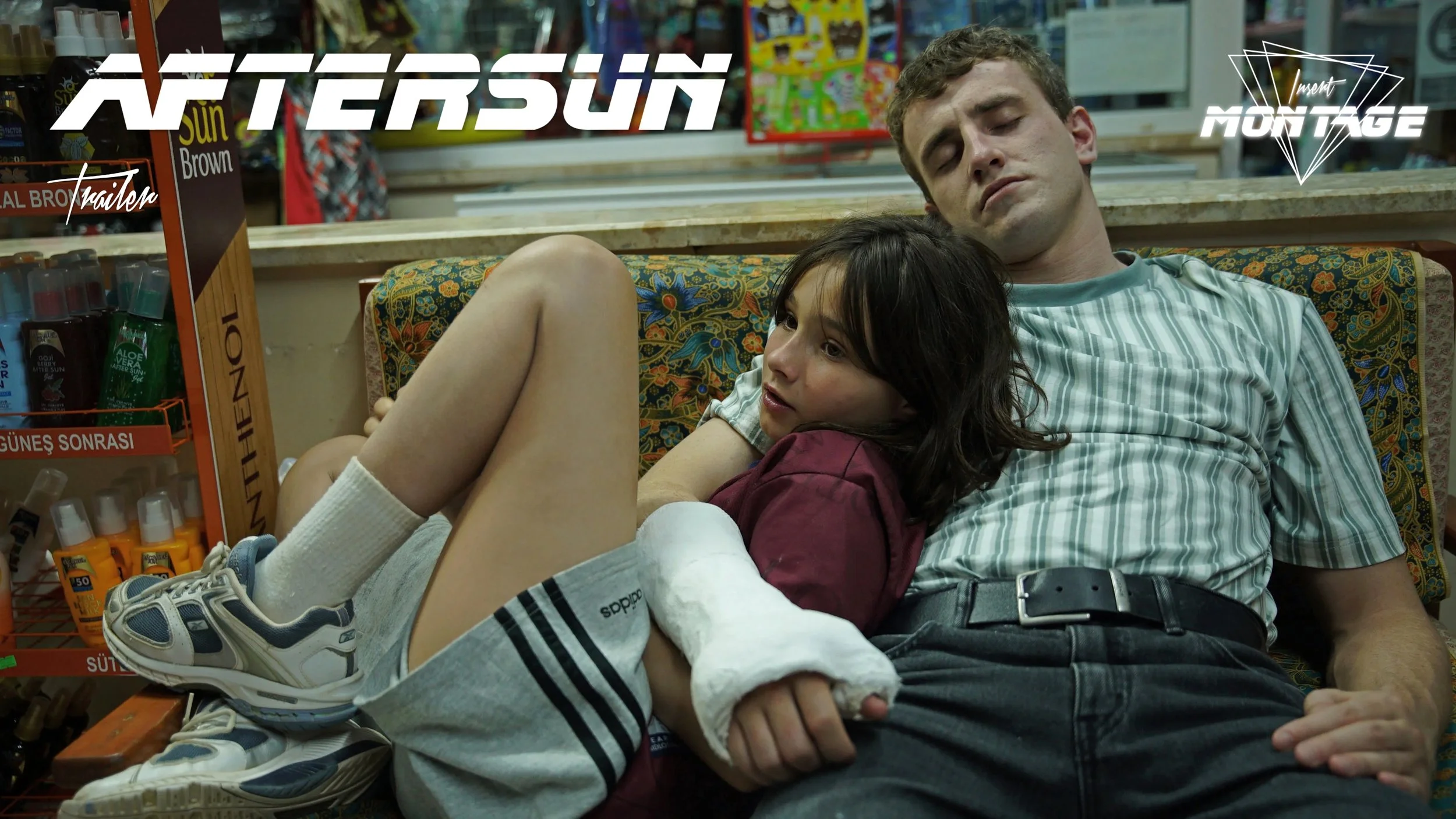AFTERSUN
A masterful, melancholic meditation on love & memory.
Memory is a funny old thing. Without it we are nothing, yet, even when we believe it to be in fine fettle, the ease to which memory can be shaped, manipulated, and controlled – even by ourselves – often leaves it (and us) painfully exposed.
Part time capsule, part thought collection, part nostalgia machine, there is perhaps no better memory manipulator out there than film. At its core, cinema is a memory factory, one that churns out images and curated recall nuggets that have been shaping and informing our lives for decades, whether we like it or not.
Many films play a subtle game with our memories, probing and stoking them gently to illicit a reaction. However, there are those, like Aftersun, that go that little bit deeper and that little bit further to confront us with the very concept of memory and our, quite often painful, relationship with it.
Twenty years after their last holiday at a fading all-inclusive Turkish resort, Sophie (Frankie Corio/Celia Rowlson Hall) reflects on the rare time spent with her loving, idealistic father Calum (Paul Mescal). With Sophie celebrating her 11th birthday, and as the world of adolescence creeps into her view, Calum struggles under the weight of life both in and around fatherhood. As she sinks deeper into these memories, Sophie's recollections become a powerful and heartrending portrait of their relationship, as she tries to reconcile the father she knew with the man she didn't.
Like rifling through an old photo album or watching a home video unearthed in your parent’s loft, Aftersun is less a story than a loving jumble of long forgotten memories. A synapse-sparking flick book of moments from holidays past, the film may feel, on the surface at least, like it’s not telling us anything, however, dig a little deeper and you’ll realise it’s actually showing us everything.
With an almost non-existent plot and a decidedly measured pace, it certainly takes a minute to align with Aftersun’s low-key sensibilities, however, as the narrative slowly clicks and as its destination steadily comes into focus, its true power can be felt. In what is, remarkably, her debut feature, writer-director Charlotte Wells revels in painstakingly piecing together Aftersun’s fractured memory shards, as what begins as a charming, small scale coming-of-age story gradually grows into something far more emotionally substantial.
As fractured and fragmented recollections fade in and out of Aftersun’s consciousness, Wells is happy to allow her film the time and space to gather its thoughts, crafting a fitting representation of the often complex relationship we have with memories of our loved ones. Set in an infinitely recognisable late-90s all-inclusive resort and consisting of moments of joy and charming holiday mundanity, Wells very much frames her film as our own personal journey through adolescence, and while our own lives may not end in the same way as Frankie’s, Aftersun offers us our own moment of quiet reflection on the moments we share with those around us.
With a wonderful lightness of touch, Wells defies her relative lack of experience to offer a true masterclass in show-don’t-tell filmmaking that trusts the audience to stay with it, fully invest in the relationship in front of them, and piece it all together where necessary. A story of highs, lows and slow burn tragedy, the result is a disorientating, yet thoroughly enthralling, viewing experience.
Often propelling itself forward on vibes alone, Aftersun feels like pure energy at times, floating along on a wave of nostalgia and ethereal intrigue before landing on something deeply profound. Although this approach may feel uncomfortable to some, the fact that Aftersun doesn’t force any of this on us plays a huge part in its success, as Wells refuses to spell anything out, leaving us free to make our own conclusions and connections.
The choice to frame the film as if we, like the adult Sophie, are rewinding back and forth through an old holiday video, is an exceedingly smart one that allows us to dig deep into this fractured paternal bond, yet it never feels like Wells is spoon feeding us emotion or sentimentality. As scenes appear and disappear as they would in our mind’s eye, it grants us a unique window into the relationship between Calum and Sophie, one that shows a young girl tentatively finding her way in the world while her father struggles silently with his own journey.
As a depiction of mental health struggles, Aftersun wisely eschews any temptation for heightened melodrama, preferring instead to take an approach that feels utterly authentic and deeply human. Mental health, especially that of men, is such a vital subject right now, so any attempt to broach the issue must be done with care, something that Wells achieves beautifully and in such an immensely caring way that it, with any luck, will hopefully open up a conversation on a matter that’s been criminally ignored for far too long.
With the story steadily edging towards its (quite stunning) conclusion, we gradually learn that all is not what it seems with Calum, as troubles from his past and in his head clearly weigh heavy on his shoulders. The fact that he suffers through all this in silence, and that we never truly discover the root cause of this pain, only compounds Aftersun’s powerful, lasting impact.
For such a hyper-focused narrative broaching an incredibly sensitive subject with not much in the way of plot to fall back on, there’s an awful lot of pressure on both Paul Mescal and Frankie Corio, but as a pair and as individuals, they are a revelation. The chemistry and dynamic the two share are a crucial part in Aftersun’s ultimate success, and the emotional attachment the film builds between us and them with so little story is something truly special.
Building on his breakout success with Normal People, Paul Mescal puts in a stunning performance that deftly balances the dutiful silliness of being a dad with powerfully affective moments of vulnerability and melancholy that hang heavy over his character. Alongside him, young Frankie Corio is an absolute revelation, giving an assured and wholly natural performance of a kid just looking to enjoy this moment with her father, blissfully unaware of the darkness bubbling under his surface, yet clearly sensing all is not well.
A charming, understated father-daughter coming-of-age tale at its heart, Aftersun slowly builds to something altogether different, yet powerfully affecting. As fractured and fragmented moments fade in and out of the film’s consciousness, Charlotte Wells’ assured direction and the affecting performances of Paul Mescal and Frankie Corio hit right to the heart of our complex relationship with memories, especially those of our loved ones, and will undoubtedly leave you an emotional wreck by its end.




